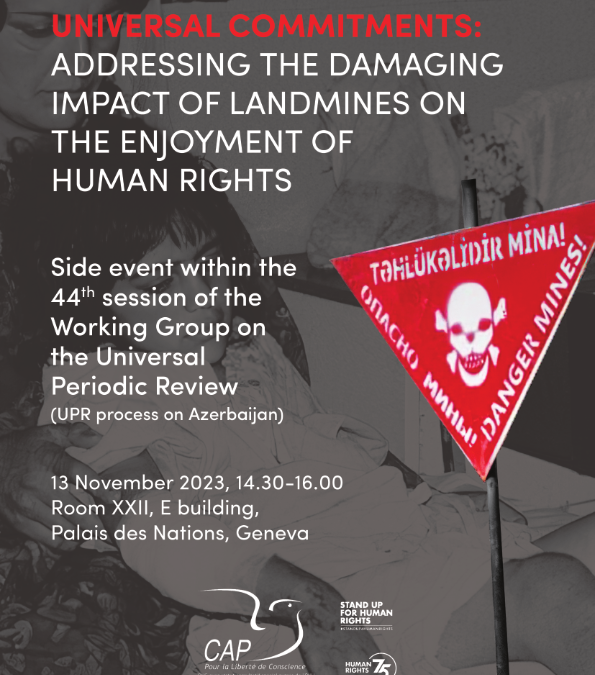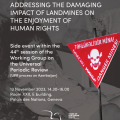UPHOLDING UNIVERSAL COMMITMENTS:
Addressing the damaging impact of landmines on the enjoyment of human rights.
Side event within the 44th session of the Universal Periodic Review Working Group.
UPR Process on Azerbaijan
13 November 2023, 14.00-16h30
UN Geneva, room XXII
The aim of this side-event we are organising today is to highlight points 203 and 204 of Azerbaijan’s national report on landmines.
“203. Mine and unexploded ordnance clearance in the liberated areas remains a serious problem. Even after the signing of the Trilateral Declaration, the Armenian Armed Forces conducted intensive de-mining operations in the Aghdam, Kelbajar and Lachin districts, in flagrant violation of that document, which provides, inter alia, for the cessation of all military activities. As a result, soldiers and civilians continue to be killed by mines in the liberated areas. In total, more than three thousand people have been killed by mines since the beginning of the Armenian military aggression in the 1990s. This includes more than three hundred people who have been killed by mines in the post-conflict period following the signing of the Tripartite Declaration. Between August 2022 and today, 3,166 anti-personnel mines produced in Armenia in 2021 have been discovered on the territory of Azerbaijan alone. These mines pose an urgent humanitarian threat to people hoping for a speedy return to their homes and the restoration of a normal, peaceful life.
204. Of particular concern was the use of the Lachin road by the Armenian side for illegal military purposes, including for the rotation of its illegal armed formations, the transfer and planting of new anti-personnel mines, as well as for the transportation of illegally exploited natural resources from the territory of Azerbaijan and the illegal passage of third-country nationals into the territory of Azerbaijan for disreputable purposes.”
Objective
With an estimated 26,000 people a year becoming landmine victims, this indiscriminate weaponry poses one of the most challenging threats to human life and dignity and thus affects inalienable fundamental human rights.
The UN human rights machinery has a key role in addressing the negative impact of landmines, explosive remnants of war and other improvised explosive devices on the enjoyment of human rights of mine victims in the context of humanitarian mine action. It can also be instrumental in bringing to the fore the utmost importance of providing international assistance in mine action including protection and restoration of inalienable human rights of mine victims.
The side event intends to discuss humanitarian mine actions in light of this very role of the UN human rights machinery. It also aims to raise awareness on the importance of full and effective protection of fundamental human rights when related to humanitarian mine action. Other objectives of the event include exploring effective ways to address the humanitarian, socio-economic and environmental impact of landmines, explosive remnants of war and other IEDs; highlighting the importance of international cooperation and assistance in mine action which aims at eliminating the threat posed by mine contamination to the security of States and safety of their populations, facilitating post-conflict rehabilitation, including the return of refugees and IDPs to their homes, and contributing to sustainable peace and development.
Background
Landmines, explosive remnants of war and improvised explosive devices pose a serious and indiscriminate threat to life, safety and livelihoods of civilians, including in the post-conflict period, inter alia creating additional obstacles for the return of refugees and IDPs to their homes, thus violating their fundamental human rights. They undermine prospects for attaining sustainable peace, security and development, as well as for enabling the enjoyment of human rights. A direct link between Mine Action and the 2030 Agenda for Sustainable Development, including its Sustainable Development Goals (SDGs) framework, is well recognized, even some of the Member States suggest to include SDG 18 related to the threats posed by mines and their negative impact on the enjoyment of human rights.
1997 Convention on the Prohibition of the Use, Stockpiling, Production and Transfer of Anti- Personnel Mines and on their Destruction became an important milestone which boosted mine action globally. Despite the progress achieved in the area of mine clearance, landmines, explosive remnants of war and other improvised explosive devices continue to threaten and claim the lives of civilians on a regular basis and the lethal cases caused by the explosion of mines have recently been on the rise.
In 2017, the UNSC adopted its first-ever stand-alone resolution dedicated to the issue of mine action (UNSCR 2365). The resolution inter alia calls on all Member States to abide by their international obligations related to mine action, and on States, international organizations, civil society and other stakeholders to provide assistance in mine action upon request of States. However, existing international mechanisms do not fully address the damaging impact of landmines on the enjoyment of fundamental human rights.
In this regard efforts towards full and effective implementation of international human rights commitments in the context of mine action are of paramount importance for fulfilling the tasks of the UNSCR 2365 and contributing to sustainable peace, security and development globally.
Composition of the side event
The side event to be attended by representatives of Geneva-based international organizations, diplomatic and civil society communities, will bring together a panel of international experts and practitioners in the field of human rights and humanitarian demining to discuss the above-stated issues and present some concrete proposals in this regard.
*Light Lunch will be provided




